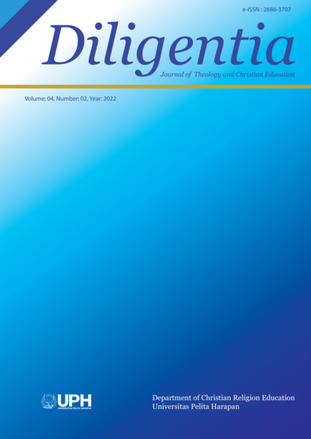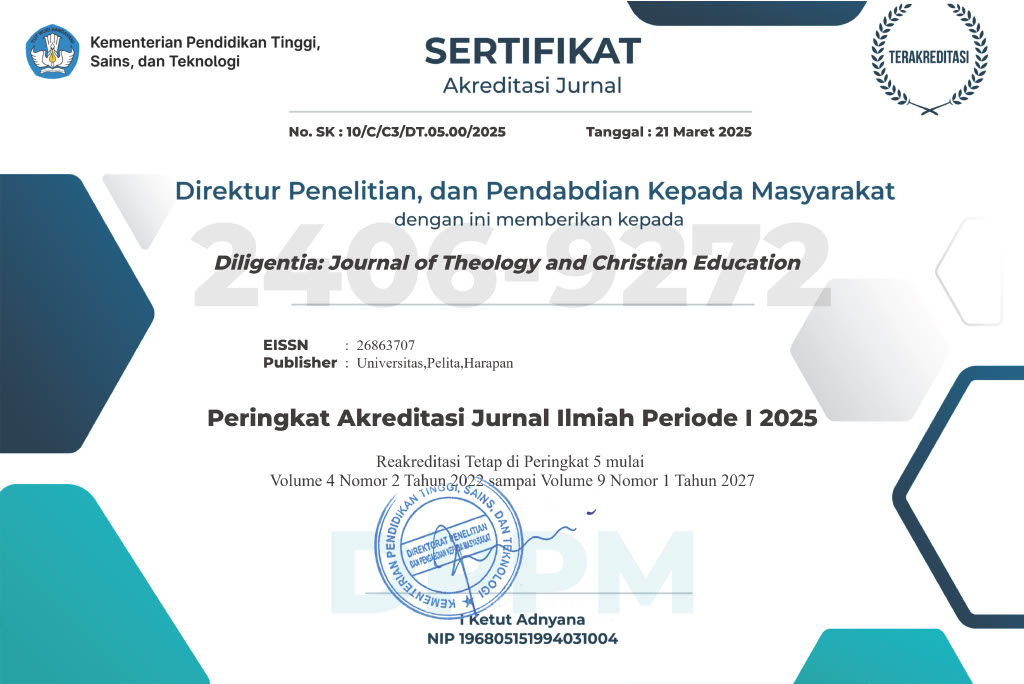Memahami Makna Tujuan Utama Manusia: Sebuah Refleksi Katekismus Singkat Westminster [Understanding the Meaning of The Chief End of Man: A Reflection of the Westminster Shorter Catechism]
DOI:
https://doi.org/10.19166/dil.v4i2.5370Λέξεις-κλειδιά:
Glorifying God, enjoying God, the chief end of man, spiritual growth, memuliakan Allah, menikmati Allah, tujuan utama manusia, pertumbuhan rohaniΠερίληψη
The chief end of man is to glorify God and enjoy Him throughout his life according to Westminster Shorter Catechism. Glorifying God and enjoying Him means that humans acknowledge the existence of God and apply God's truth in all aspects of their lives according to the Word of God. Enjoying and glorifying God is a privilege given by God to Christians who are created in the image and likeness of God. As a result of the fall of man into sin, and sinful humans cannot know God properly according to the Word of God. The redemption of Christ on the cross reconciles believers with God, and they can relate with God even though they also have to struggle against sin. The method of writing this article uses literature research to examine the issue of the spiritual growth of believers, through various theological literature, both relevant books and journals, and the Bible as the main source. The writing of this article aims to understand the purpose of human life which is to glorify and enjoy God throughout life, and its application in daily life, recognizing the various traps of false spiritual growth. Glorifying God and enjoying Him could only be experienced when believers experience Christ's redemption and grow more Christlike in absolute obedience to Christ.
BAHASA INDONESIA ABSTRACT: Tujuan utama manusia adalah untuk memuliakan Allah dan menikmati Dia sepanjang hidupnya menurut Katekismus Singkat Westminster. Memuliakan Tuhan dan menikmati Dia berarti manusia mengakui keberadaan Tuhan dan menerapkan kebenaran Tuhan dalam seluruh aspek kehidupannya sesuai dengan Firman Tuhan. Menikmati dan memuliakan Allah adalah hak istimewa yang diberikan Allah kepada orang Kristen yang diciptakan menurut gambar dan rupa Allah. Akibat kejatuhan manusia ke dalam dosa, manusia yang berdosa tidak dapat mengenal Allah dengan benar sesuai dengan Firman Tuhan. Penebusan Kristus di kayu salib memperdamaikan orang percaya dengan Allah, dan mereka dapat berhubungan dengan Allah walaupun mereka juga harus bergumul melawan dosa. Metode penulisan artikel ini menggunakan penelitian kepustakaan untuk menelaah masalah pertumbuhan rohani orang percaya, melalui berbagai literatur teologi, baik buku-buku maupun jurnal yang relevan, dan Alkitab sebagai sumber utama. Penulisan artikel ini bertujuan untuk memahami tujuan hidup manusia yaitu memuliakan dan menikmati Tuhan sepanjang hidup, serta penerapannya dalam kehidupan sehari-hari, dengan mengenali berbagai jebakan pertumbuhan rohani yang palsu. Memuliakan Tuhan dan menikmati Dia hanya dapat dialami ketika orang percaya mengalami penebusan Kristus dan bertumbuh menjadi semakin serupa dengan Kristus dalam ketaatan yang mutlak kepada Kristus.
Αναφορές
Barret, Michael. “Living Out Our Faith: The Christian Life Inside Out.” In The Beauty and Glory of Christian Living, edited by Joel R. Beeke, 8-20. Grand Rapids, MI: Reformation Heritage Book, 2014.
Bavinck, Herman. Dogmatika Reformed 2: Allah Dan Penciptaan. Surabaya: Momentum, 2012.
Bavinck, Herman. Reformed Dogmatic: Abridged in One Volume. Grand Rapids, MI: Baker Academic, 2011.
Beckmann, David N. “Praying The Catechism: A Prayer Based on The Larger Catechism’s Exposition of The Lord’s Prayer.” Presbyterion 16, no. 2 (1990): 81-88. https://web.s.ebscohost.com/ehost/pdfviewer/pdfviewer?.
Beeke, Joel R. “The Transforming Power of Puritan Doctrinal Preaching: The Westminster Directory and Its Application for Today.” The Master’s Seminary Journal 32, no. 2 (2021). https://web.s.ebscohost.com/ehost/pdfviewer/pdfviewer?.
Brummelen, Harro Van. Berjalan Dengan Tuhan Di Dalam Kelas. Jakarta, Indonesia: Universitas Pelita Harapan Press, 2009.
Chamblin, Knox. Paulus Dan Diri: Ajaran Rasuli Bagi Keutuhan Pribadi. Edited by Jeane Obadja. Surabaya, Indonesia: Momentum, 2008.
Edwards, Jonathan. Pengalaman Rohani Sejati. Edited by Solomon Yo. 4th ed. Surabaya, Indonesia: Momentum, 2011.
Ferguson, Sinclair B. Hati Yang Dipersembahkan Kepada Allah. Edited by Solomon Yo. Surabaya, Indonesia: Momentum, 2002.
Groothuis, Douglas. Pudarnya Kebenaran: Membela Kekristenan Terhadap Tantangan Postmodernisme. Surabaya, Indonesia: Momentum, 2003.
Hall, Joseph H. “Catechisms of The Reformed Reformation.” Presbyterion 5, no. 2 (1979): 87-98. https://web.s.ebscohost.com/ehost/pdfviewer/pdfviewer.
Hawthorne, Gerald F. Word Biblical Commentary: Philippians. Edited by David Hubbard. Waco, TX: Word Book, Publishers, 1983.
Hoekema, Anthony A. Manusia: Ciptaan Menurut Gambar Allah. Edited by Solomon Yo. Surabaya, Indonesia: Momentum, 2010.
Hubbard, D.A., Lasor, W. S., Bush, F. W. Pengantar Perjanjian Lama 1: Taurat Dan Sejarah. Jakarta, Indonesia: BPK Gunung Mulia, 2019.
Macedo, Breno. “From Dogma to Practice: Systematic Theology and Application in The Sermons of The Scottish Commissioner to The Westminster Assembly.” Westminster Theological Journal 77, no. 2 (2015): 317-36. https://web.s.ebscohost.com/ehost/pdfviewer/pdfviewer?.
Nettles, Tom. “An Encouragement to Use Catechisms.” The Journal of Discipleship & Family Ministry 4, no. 2 (2014): 6-26. https://web.p.ebscohost.com/ehost/pdfviewer/pdfviewer?.
Nichols, Stephen J. Jonathan Edwards: Penuntun Ke Dalam Kehidupan Dan Pemikirannya. Edited by Solomon Yo. Surabaya, Indonesia: Momentum, 2009.
Pate, C Marvin. “Genesis 1-3: Creation and Adam in Context.” Criswell Theological Review 10, no. 2 (2013): 3-25. https://web.p.ebscohost.com/ehost/pdfviewer/pdfviewer?vid.
Plantinga, Cornelius. Tidak Seperti Maksud Semula. Edited by Solomon Yo. Surabaya, Indonesia: Momentum, 2004.
Poythress, Vern S. Menebus Sains: Pendekatan Yang Berpusat Kepada Allah. Surabaya, Indonesia: Momentum, 2013.
Pratt, Richard L. Dirancang Bagi Kemuliaan. Edited by Hendry Ongkowidjojo. Surabaya, Indonesia: Momentum, 2002.
Stanton, Allen. “Seeds of Truth Planted in the Field of Memory": How to Utilize the Shorter Catechism.” Puritan Reformed Journal 6, no. 2 (2014): 270-83. https://web.s.ebscohost.com/ehost/pdfviewer/pdfviewer?vid.
Susabda, Yakub. Mengalami Kemenangan Iman: Integrasi Teologi Dan Psikologi. Jakarta, Indonesia: Literatur Perkantas, 2020.
Susabda, Yakub B. Mengenal Dan Bergaul Dengan Allah. Yogyakarta: Andi Publisher, 2010.
Thielman, Jacob. “John Wallis’s Brief And Easie Explanation In The Context Of Catechesis In Early Modern England.” Westminster Theological Journal 80 no. 2 (2018): 335-53. https://web.s.ebscohost.com/ehost/pdfviewer/.
Till, Cornelius Van. “Iman Dan Program Kita.” In Dasar Pendidikan Kristen, edited by Steve Hendra, 127-57. Surabaya, Indonesia: Momentum, 2010.
Till, Cornelius Van. “Penciptaan: Pendidikan Manusia - Kebutuhan Yang Diamanatkan Allah.” In Dasar Pendidikan Kristen, edited by Steve Hendra, 63-97. Surabaya, Indonesia: Momentum, 2010.
Till, Cornelius Van. Pengantar Theologi Sistematik: Prolegomena Dan Doktrin Wahyu, Alkitab, Dan Allah. Surabaya, Indonesia: Momentum, 2010.
Tipton, Lane G. “Biblical Theology and The Westminster Standards Revised: Union with Christ and Justification Sola Fide.” Westminster Theological Journal 75 (2013).
Vlastuin, Willem van. “Personal Renewal between Heidelberg and Westminster.” Journal of Reformed Theology 5 (2011): 49-67. https://doi.org/10.1163/156973111X562210.
Williamson, G. I. Katekismus Singkat Westminster 1. Edited by Irwan Hartonon, Rudy., Tjulianto. Surabaya, Indonesia: Momentum, 2021.
Wolters, Albert M. Pemulihan Ciptaan. Surabaya, Indonesia: Momentum, 2010.
Wolterstorff, Nicholas P. Mendidik Untuk Kehidupan: Refleksi Mengenai Pengajaran Dan Pembelajaran Kristen. Surabaya, Indonesia: Momentum, 2014.
Λήψεις
Δημοσιευμένα
Πώς να δημιουργήσετε Αναφορές
Τεύχος
Ενότητα
Άδεια
Authors who publish with this journal agree to the following terms:
1) Authors retain copyright and grant the journal right of first publication with the work simultaneously licensed under a Creative Commons Attribution License (CC-BY-SA 4.0) that allows others to share the work with an acknowledgement of the work's authorship and initial publication in this journal.
2) Authors are able to enter into separate, additional contractual arrangements for the non-exclusive distribution of the journal's published version of the work (e.g., post it to an institutional repository or publish it in a book), with an acknowledgement of its initial publication in this journal.
3) Authors are permitted and encouraged to post their work online (e.g., in institutional repositories or on their website). The final published PDF should be used and bibliographic details that credit the publication in this journal should be included














